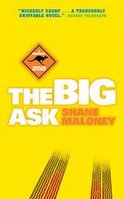Olympic fact, fiction, and crime

"Even before the 2012 Games formally opened Friday night, east London, an area with some of the highest unemployment and crime rates in the country, had been visibly transformed by the world’s biggest sporting event. More than $14 billion has been poured into the London Games, for building Olympic facilities, upgrading public transportation and scrubbing the high streets near venues, the government says. The new shopping mall alone has brought about 8,000 jobs."
— New York Times News Service
"(H)e went looking for a taxi in paseo Maratimo, a street seemingly frozen in time and place as it waited for the extension which would link it to the Olympic Village. In the distance, the houses that had been demolished for the construction of the Olympic sports facilities looked more like a set for a film about the bombing of Dresden, The new city would no longer feel like the city he knew ..."The Times strikes a note of authenticity for its American readers, calling main streets high streets. More interesting is that the most trenchant of its responses from the Other Side of the Story comes not from an activist or area resident or member of a leftist think tank, but rather from Colin Ellis, senior vice president for credit policy at Moody’s Investor Services. “Looking at the big picture," says Ellis, “we think that corporate sponsors will benefit most. The Olympics are unlikely to provide a substantial economic boost.”
— Manuel Vázquez Montalbán, Off Side
I wonder
a) whether Mr. Ellis would have been brave enough to utter such a prediction seven years ago, when London was awarded the Olympics,
and
b) what Vázquez Montalbán, that man of the left, would have thought of such an utterance from an executive of “an essential component of the global capital markets.”
 Here's a previous Detectives Beyond Borders post that touches on the London Olympics. And here's a post about Shane Maloney's novel Nice Try, set during Melbourne's failed bid for the 1996 Olympics. What other Olympics-related crime fiction can you think of?
Here's a previous Detectives Beyond Borders post that touches on the London Olympics. And here's a post about Shane Maloney's novel Nice Try, set during Melbourne's failed bid for the 1996 Olympics. What other Olympics-related crime fiction can you think of?© Peter Rozovsky 2012
Labels: Barcelona, Manuel Vázquez Montalbán, Offside, Olympic Games, Olympics, Shane Maloney, Spain




















